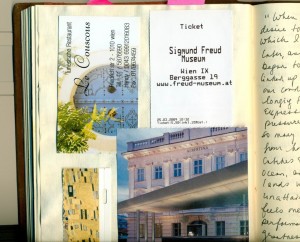
Last year I went to Vienna to do research for a novel. I hadn’t really wanted to go to Vienna. It wasn’t on my wish list. But part of this book is set there and so I need to go. And in fact we wound up falling in love with the city. We spent literally days in front of the paintings of Egon Schiele (a brilliant artist who died of influenza in 1918 at the age of 28. His “Death and the Maiden” is something I will never forget.)
We were supposed to also go to Budapest and perhaps Bratslava. In fact we had changed money for Hungary. Every morning we woke up and said, “Okay is this the day we go to Budapest.” But we never did. Instead we roamed this city of wide avenues, imperial architecture, dirty black crows. A city of cafes and gardens, of Schiller and Beethoven. We learned that it was here at the Vienna Academy of Fine Arts that a failing art student, named Adolf Hitler, began to listen to the speeches of Vienna’s mayor, Karl Luger, and his own ideas would be shaped, even as his art career dwindled.
I couldn’t help but think about what would have happened had he been a successful student of art. We roamed this city. It was cold, late March, but the sun shone, and every day we sat out, searching for another cafe, another great museum, the cobbled streets of the Judenplatz. The Weisbanhoff station from which Jewish children left on the kindertransports. All of Vienna became mixed in our minds. On Bergasse Street we visited the Freud Museum.
We walked into the dark, stone courtyard and wound our way up the cement spiral staircase where Herr Doktor Freud, that interpreter of longings and dreams, once lived. We entered the grand old apartment where he lived with his wife and six children until even he was forced to flee the Nazis, carrying with him his final manuscript for the pyschoanalaysis of the Bible. There on the wall of his study I found this quote on travel.
Freud writes: “When I recall the passionate desire to travel and see the world by which I was dominated at school and later, how it was before that desire began to find its fulfillment…This was linked up with the limitations and poverty of our conditions of life in my youth. My longing to travel was no doubt also the expression of a wife to escape from this pressure like the force which drives so many adolescent children to run away from home and family. When first one catches sight of the sea, crosses the ocean, and experiences as realities cities and lands which for so long had been distant, unattainable things of our desire – one feels ones like a hero who has performed deeds of an improbable greatness.”
Sigmund Freud sees in travel its inate escapism. The desire to flee one’s longing, one’s implacable desire. Jonathan Swift is perhaps more direct, and humor, in Gulliver’s Travels when Gulliver reflects upon his Master, Mr. Bates, and how Master Bates encouraged him to go away. My students blushed when I spoke to them of Master Bates, but still the meaning wasn’t lost on them. That the adolescent needs to flee the self-referential world in which he or she lives.
It is interesting that they now call those years after college and before one settles into one’s life work and domestic partnership the Odyssey years. What better metaphor than to evoke the greatest traveler, the traveler upon whom all future journeys were made, Odysseus. Of course his travel was of necessity. He wanted to sail home and, despite many obstacles and detours and temptations in his path, he managed to do so.
Indeed a significant part of the journey is the return. The lost, the disappeared, this is not the journey of moving past an ononistic exist into one of mutuality and dialogue. Clearly all the male heroes mentioned here needed to get away in order to grow up. The Sirens tempted Ulysseus, but it was Penelope who awaited him at home. I do not care if travel is about escapism. It is satisfies an ancient need, a longing and a desire. I’d rather find mine on the road than in a squalid bed with a stranger. Master Bates encourages Gulliver, who is in fact gullible, to set off and find himself.
I doubt that Herr Doktor Freud could have said it better himself. I have found that I can’t not travel. I do better in motion. When I am planning a trip, all the aches and pains mysteriously leave my body. I am in flight mode. One I had this wonderful dream. Perhaps I have put it in this blog before, but I’ll repeat it if I may. I dreamt that I was flying. I was flying all over the world. Over mountains and deserts and seas and jungles and places I’d never seen or knew existed. And I couldn’t get lost because my belly button was equipped with navigational redial. I simply had to push it and I’d fly home.
Leave a Reply